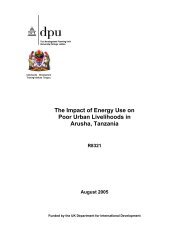EPA Review Annex Documents - DFID
EPA Review Annex Documents - DFID
EPA Review Annex Documents - DFID
Create successful ePaper yourself
Turn your PDF publications into a flip-book with our unique Google optimized e-Paper software.
• The simultaneous application of anti-dumping and compensatory measures on the same<br />
products especially when one of the measures is not sufficient to repair the damage caused<br />
(WA position); A joint text on trade defence instruments has been agreed.<br />
• The elimination of the need for clearing agents and pre-boarding inspection (EC position); the<br />
parties have agreed to respect the WTO Agreement on pre-shipment inspections. The<br />
Parties recognise the desirability of moving towards the elimination of all requirements<br />
relating to pre-shipment or destination inspections and will tackle this question in the special<br />
committee on customs and trade facilitation. This is not an issue anymore.<br />
• The mutual obligation to prevent exports of prohibited products (due to standard and safety<br />
reasons) to the other party’s territory, except when the relevant authorities of the importing<br />
party otherwise allows (WA position); the text on SPS – TBT has already been agreed<br />
between the parties.<br />
• Application of the principle of asymmetry in the rules conferring originating status and the<br />
possibility to cumulate with all developing countries (WA position); this is an area of<br />
disagreement. However, substantial progress was made in Rules of Origin in the last<br />
negotiating session in Dakar.<br />
• The inclusion of a non-execution clause that introduces a link between the issues related to<br />
trade and political dialogue (EC position); this is an area where there is yet an agreement.<br />
• The treatment for investment and competition which for WA should be limited to provision on<br />
cooperation with the view to reinforce capacities in the region (WA position); the chief<br />
negotiators decided in June 2009 to adopt a two-phase approach to the negotiations. These<br />
should be carried out as follows: an intensive phase of negotiation with a view to reaching<br />
agreement by October 2009 on a regional <strong>EPA</strong> covering trade in goods, <strong>EPA</strong>-related<br />
development cooperation and certain trade-related issues; a phase initiated no later than<br />
January 2010 with a view to broaden the negotiations in order to cover the remaining topics<br />
which will complete the regional <strong>EPA</strong>. The Chief negotiators also recognised the importance<br />
of trade-related rules in the regional integration context, as an instrument for the<br />
modernisation of the business environment, for improving economic governance, and for<br />
attracting investment capital. Investment and competition will then be considered in the<br />
second stage.<br />
• Taking into account infrastructures in the <strong>EPA</strong> framework for the development of RIP 10 th<br />
EDF (WA position); Infrastructure is one of the five main axes of the <strong>EPA</strong> Development<br />
Program, and that is what the EC is using as its basis to support the <strong>EPA</strong>.<br />
While it may seem sensible for services negotiation and the Singapore issues to remain<br />
at the multilateral level so that it would be easier to negotiate and look forward to a “goods<br />
only” agreement rather than group together certain issues like competition, intellectual property,<br />
services, which make negotiations complex, it may be right to simultaneously negotiate all <strong>EPA</strong><br />
issues from the development and not a trade perspective. The enthusiasm for <strong>EPA</strong> as a viable<br />
development instrument that has anti-poverty and human focus is a situation whereby economic<br />
liberalisation could fast track development. This is particularly in relation to what countries in the<br />
West African region can do for themselves to benefit and cut off the dependency syndrome by<br />
replacing aid with trade. The stronger and more economically independent countries there are in<br />
the region the more benefits for all the countries in the region. Therefore, a more holistic<br />
negotiating agenda such as currently structured is more development-friendly than ‘goods only’<br />
<strong>EPA</strong>. Nonetheless, it will naturally take more time to complete negotiations the more issues<br />
there are to negotiate. There is adequate technical advisory capacity on all the issues in<br />
Nigeria, e.g. technical advisory committee on services, on WTO, etc., but it is the lack of political<br />
will to appropriately use this capacity that is problematic. Nigeria in turn, has the ability to drive<br />
ECOWAS to reduce the time constraint.<br />
138
















